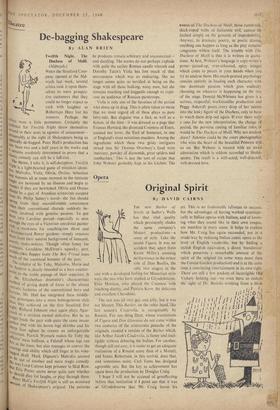T heatre
De-bagging Shakespeare
By ALAN BRIEN WHEN the Stratford Com- pany opened at the Ald- wych last week, several critics took it upon them- selves to warn prospec- tive customers that they could no longer expect to rock with laughter as Robertsyn Hare lost his Itklienee for Twelfth Night threw themselves 'Irnund in their seats in agonies of amusement— Presumably at the sight of Shakespeare being so „(11111cally de-bagged. Peter Hall's production has ''aw been two and a half years in the works and remains resolutely determined to prove that a classic comedy can still be a laff-riot. .the theme, I take it, is self-deception. Twelfth right is a light-hearted game of mistaken 'denu- des. Malvolio, Viola, Olivia, Orsino, Sebastian ;111d Antonio all at some moment in the intricate ''agle are bemused by an illusion and begin to `''elder if they are bewitched. Olivia and Orsino be a pair of Arcadian aristocrats escaped 1"0.1 Sir Philip Sidney's novel--the fun should 'Ilriog from their uncomfortable amazement "hen their conventional charade suddenly be- `tries involved with genuine I passion. To put into Caroline period—especially as seen Through the eyes of a Victorian anecdotal painter (.;111 a weakness for coaching-inn decor and onristmas-card flower gardens--simply removes :tem from their natural background of innocent, 0'41111Y make-believe. Though often funny for Geraldine McEwan's squeaky, pert, 11(1(11e-class flapper from The Boy Friend loses l'iueh of the continual humour of the part. \. he subplot of Sir Toby, Malvolio, Maria and ,!1., Andrew is clearly intended as a bass counter- "1"t to the treble pipings of their superiors. It the Elizabethan dramatist's characteristic o'lethod of giving depth of focus to the almost 111)`1'''tie fooleries of the conventional hero and Mr. Hall has integrated these middle- `I's grotesques into a more homogeneous style 1,1241 11 they achieved on the first Stratford firs ;8t. Richard Johnson once again plays Ague- ghee lk as a stricken mental defective. But he no "Ogee loads the part with quite the same insane :tilos and with his heron legs akimbo and his face aghast he creates an unforgettable 41,teature. Patrick Wymark makes Sir Toby the 1),icers' mess buffoon, a Falstaff whose legs can at the knee, but also manages to convey the ,, ttraCe and ability which still linger in his wine- :)gged skull. Mark Dignam's Malvolio seemed ‘he out of another and more tragic comedy. was Lord Curzon kept prisoner in Skid Row. hvut Erie Porter seems never quite sure whether Peter play for laughs, or play through them. e.ter Hall's Twelfth Night is still an atomised version of Shakespeare's original. The patterns he produces remain arbitrary and unconnected— and dazzling. The scenes do not perhaps explode with quite the earlier Roman candle whoosh and Dorothy Tutin's Viola has lost much of that nervousness which was so endearing. She no longer seems quite so terrified at being on the stage with all those hulking, noisy men, but she remains touching and huggable enough to capti- vate an audience of Russian paratroops.
Viola is only one of the heroines of the period who dress up in drag. This is often taken to mean that we must regard all of these plays as pure fairy-tale. But disguise was a fact, as well as a fiction, of the time---it was dressed as a page that Frances Howard, the divorced Countess of Essex, assisted her lover, the Earl of Somerset, in one of: England's most notorious murders. Among the ingredients which these two grisly intriguers mixed into Sir Thomas Overbury's food were 'mercury, powder of diamonds, great spiders and cantharides.' This is just the sort of recipe that John Webster probably kept in his kitchen. The events of The Duchess of Malfi, those cumbrous.
thick-roped webs of italianate evil, cannot b'e faulted simply on the grounds of improbabilitY,.
Anyway, in dramatic poetry, or poetic drama, anything can happen as long as the play remains congruous within itself. The trouble with The Duchess of Malfi is that it is written in quota- tions. At best, V■rebster's language is copy-writer's prose—jazzed-up, over-coloured, spicy images which come to pieces in your hands when you try to analyse them. His much-praised psychology consists entirely in loading each character with one dominant passion which goes endlessly churning on whatever is happening on the rest of the stage. Donald McWhinnie has given it a serious, respectful, workthanlike production and Peggy Ashcroft pours every drop of her talents into the leaky figure of the Duchess, only to ha■e to watch them drip out again. If ever there we fe a case for the new interpretation, the change of period, the perverse casting of familiar roles, it would be The Duchess of Malfi. Why not modern dress? Antonio could be the court photographer who wins the heart of the beautiful Princess aqd so on. But Webster is treated with an ii.\\ admiration which is seldom accorded to Shake- speare. The result is a well-acted, well-directed. well-dressed bore.


























 Previous page
Previous page